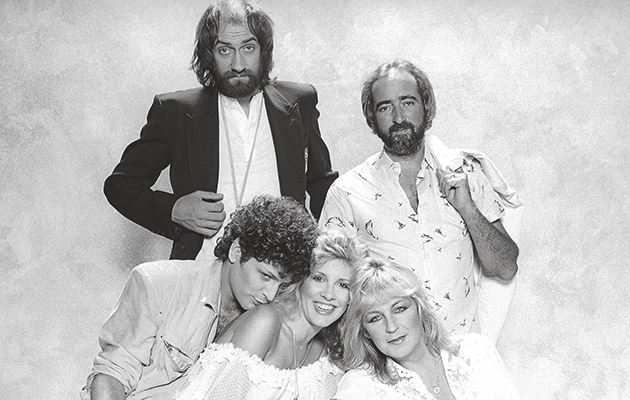By the end of the Tusk world tour in August 1980, Fleetwood Mac were in meltdown. The separate limos were just one example of the lengths to which they would go to avoid each others’ company. Ironically, it was that very extravagance – and, perhaps, a sense of loyalty to their bearded leader Mick Fleetwood – that forced them back together less than a year later to begin work on a new album that would placate the accountants still counting the cost of giant inflatable penguins and hotel suites furnished with white pianos.
With Lindsey Buckingham and Stevie Nicks in the process of launching ambitious solo careers, it was inconceivable that they would reserve their best songs for Mirage. Christine McVie recently confessed to Uncut that the album lacked passion, while Buckingham admitted he was “treading water”. And yet the fact that its principals had one eye elsewhere only seems to enhance Mirage’s flimsy, diaphanous charm.
Nicks’ response at being cajoled back into the studio with two of her ex-lovers was to retreat, profitably, into nostalgia. “Gypsy” wistfully invokes her pre-fame existence of second-hand lace and mattresses on the floor, creating a powerful affirmation of the Nicks brand. The melody may be slight but it’s kept airborne by some classic Mac magic: sighed harmonies, a chiming riff and Nicks’ stunning vocals contoured by a decade of arena tours and emotional turmoil.
Indeed, if a Fleetwood Mac album wasn’t beset by emotional turmoil then they would endeavour to create some. Christine McVie duly turned up to recording sessions in Hérouville, France, having recently ended her tempestuous relationship with Dennis Wilson; the bittersweet punch of “Hold Me” was her consolation, with “Only Over You” bearing a direct dedication to the wayward Beach Boy who was to drown the following year.
Ultimately there is just enough underlying pain to make to prevent Mirage from floating away. It sounds immaculate, but there is no edge; no equivalent of “Tusk” or “The Chain”. The album’s biggest curveball is Buckingham’s weedy Roy Orbison tribute “Oh, Diane” – a flop single in the States but a Top 10 hit over here where its faux-rockabilly stylings evidently resonated with Shakin’ Stevens fans.
Elsewhere, however, Buckingham’s 50s fetish is actually a boon. The way the doo-wop verses of “Book Of Love” submit to its biting powerpop chorus is inspired, and there is a lightness of touch throughout – brisk, classically-structured songs; solos restricted to the fade-out – that has prevented Mirage from dating too badly. They even get away with the potentially hokey country stroll of “That’s Alright”, a couple of shrewd chord shifts providing the faintest waft of melancholy.
Mirage is an apt title for an album that glistens and shimmers alluringly before evaporating without leaving too much of a lasting impression. It never does more than it needs to, a state of affairs easily attributed to burnout and the distraction of solo careers. But in the long term, this air of languid passivity has worked in Mirage’s favour. Look at those other ’70s rock dinosaurs who were shifting units in 1982: Foreigner, Asia, Dire Straits. Compared to their overblown efforts, Mirage is a model of restraint and tasteful pop songwriting, a way to combine faintly rootsy rock’n’roll elements and synthetic studio gloss in a way that (“Oh Diane” aside) isn’t too corny.
As such, you can detect its faint influence on everyone from REM to Prefab Sprout. When modern-day folk-pop acts like Bat For Lashes or Vampire Weekend want to add a little ’80s sparkle to their music, this is the album that they plunder. Even on autopilot, Fleetwood Mac’s brilliantly unique permutation of singers and players were able to spin gold from the barest of ingredients.
EXTRAS: The bonus material doesn’t do much to dispel the notion that was an album whose prime cuts had already been hived off to various solo ventures. “If You Were My Love” is the exception: a gorgeous Stevie Nicks slow-burner, brimming with thwarted passion, that has mystifyingly failed to make it on to an album, despite several attempts. “Goodbye Angel” is a cursory Buckingham cast-off, while “Smile At You” is a caustic Nicks rocker that sounds out of place here (it eventually resurfaced on 2003’s Say You Will). All the other unfamiliar songs are either studio jams or covers knocked out for fun.
From the early and alternate versions, we learn that “Gypsy”’s signature recurring riff was originally played solely on glockenspiel and that it underwent a small but vital tweak before emerging as the radiant earworm we all know and love. The crunchier demo version of “Empire State” also makes more sense than the throwaway jingle that ended up on the album.
The deluxe edition includes an audio transfer of the Mirage tour video, recorded over two nights at the LA Forum in late 1982. The featherlight Mirage songs don’t translate particularly well to the live arena, but there is a stunning eight-minute version of “Sisters Of The Moon” that climaxes with Nicks jabbering furiously over Buckingham’s majestic riffage, a different sort of Mac magic.
Uncut: the spiritual home of great rock music.


